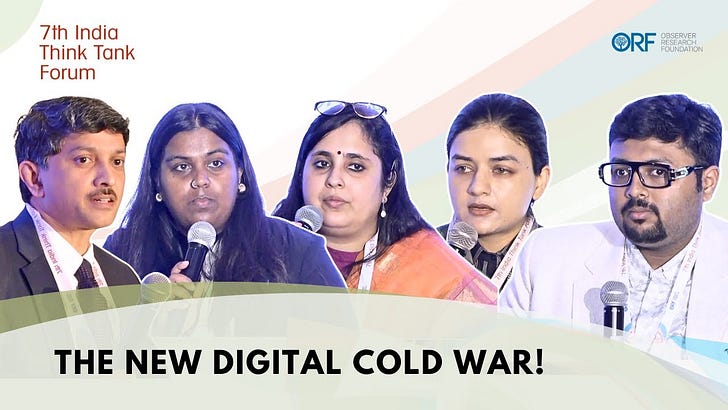Happy to share my views from a Panel on "Critical & Emerging Technologies, Power, Access & Equity" as a part of the 7th India Think Tank Forum, 2025, organised by ORF.
Watch the complete session on Observer Research Foundation's YouTube channel:
When we look at the way technology dynamics of AI in 2025, DeepSeek's reveal is a Chinese way to crack upon issues of access rights, and how the hoarding of GPUs, and exploitative use of data of AI models causes problems.
I truly believe that India can be a leader of the Global South. But beyond bureaucratic niceties and summits, leading in tech policy & capacity initiatives in the Global South is not easy. Giving access to datasets is a must to be addressed by India, and the Government must make sure that access of crucial datasets to build AI solutions in many sectors, from their end is not a bureaucratic mess.
Take, for instance, the agriculture sector. AI-powered solutions can revolutionize farming by providing predictive analytics on weather patterns, soil health, and crop diseases. However, such solutions require access to datasets on historical weather data, satellite imagery, and soil metrics. If these datasets remain locked behind bureaucratic red tape or fragmented across multiple government departments, it stifles innovation. By streamlining access to such data through open-data policies or centralized platforms, India could empower startups and researchers to build scalable solutions not just for itself but for other Global South nations facing similar challenges.
Similarly, in healthcare, AI can play a transformative role in early disease detection and personalized medicine. For example, India's vast repository of anonymized patient health records could be leveraged to train AI models that address diseases prevalent in low-income countries. Yet, if accessing this data involves navigating complex bureaucratic processes or unclear regulations, it discourages collaboration and slows progress. A proactive approach—such as creating a secure but accessible national health data repository—could position India as a pioneer in using AI for public health in the Global South.
India's leadership in this domain requires more than just policy announcements; it demands action. The government must prioritize data accessibility by reducing bureaucratic barriers, ensuring transparency, and fostering trust through robust privacy safeguards. Initiatives like the India Data Accessibility and Use Policy are steps in the right direction but need accelerated implementation with clear frameworks.
By addressing these challenges head-on, India can set an example for other nations in the Global South—showing how open access to crucial datasets can drive innovation, solve real-world problems, and foster inclusive growth. This is not just about leading; it’s about empowering others to rise together.
The Trump-Modi meeting was satisfying on the TRUST initiative, which I will discuss tomorrow.



